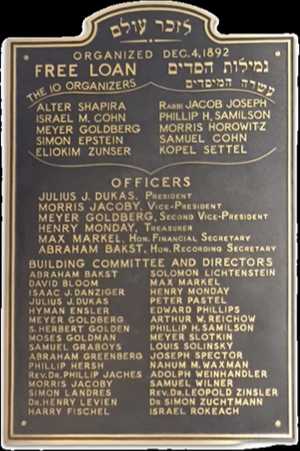A nearly 20 year long partnership between Agudath Israel of America and the Hebrew Free Loan Society (HFLS) has facilitated over 2,000 bridge loans for special education students in New York State, helping lower and moderate income families obtain the schooling they need for their children.

Under the Carter Law, private school parents who demonstrate that they cannot find an appropriate public placement for their child may be able to enroll their child in a private school program, with tuition reimbursement by the Department of Education. However, the parents had to first lay out the tuition and were later reimbursed by the Department of Education. But with tuition costs often running into tens of thousands of dollars, parents were unable to lay out the money needed to provide their children with an appropriate education.
Given those economic realities, Mrs. Leah Steinberg, Director of Agudath Israel's Project LEARN, approached Drs. Donald and Irwin Gribetz and worked with Mrs. Shana Novick of the Hebrew Free Loan Society to set up a bridge loan program for special education. HFLS loaned the parents the money until they were reimbursed by the government. With the loans guaranteed by Agudath Israel of America, and the system in place, the number of Jewish special needs schools grew dramatically.
"The original system was a catch-22," explained Mrs. Steinberg. "The tuition reimbursements were available but most parents were just not capable of laying out the large sums required for their children's special education.
"This is a wonderful partnership," Mrs. Steinberg continued, "Agudah's guarantee has made it possible for HFLS to lend needy parents millions of dollars over the years."
HFLS founders' plaque. Note that Rabbi Jacob Joseph was among the founders.

When the program began in 1999 there were just three Orthodox Jewish schools serving the special education population. Today, a 28th school is set to open soon. According to Mrs. Steinberg, the system is so seamless that most parents, and even some of the schools, are unaware of the complexities involved.
"What is amazing about this process is that parents are comfortable with the way that this works," said Mrs. Steinberg. "Instead of having to worry about where the money is coming from, they can focus on their children's other needs."
A May 30th event sponsored by the Hebrew Free Loan Society highlighted its partnership with the Agudah and included a seven minute long video demonstrating the program's success. Rabbi Chaim Dovid Zwiebel, executive vice president of the Agudah, praised HFLS's executive director Rabbi David Rosenn and deputy director Ms. Kim Kaplan, for their continued commitment to helping families obtain appropriate scholastic opportunities.
"The system wouldn't work were it not for the bridge loans that Hebrew Free Loan Society extends to these parents," said Rabbi Zwiebel. "It is thanks to them that hundreds and hundreds of children have, over the years, been able to obtain the kind of education that maximizes their potential as human beings and as members of the Jewish community."
Agudah Addresses School Safety Issues
At its most recent session, the Federal Commission on School Safety heard concerns relating to Jewish schools in testimony offered by Rabbi Abba Cohen, Agudath Israel of America's Vice President for Federal Affairs and Washington Director. It was the Commission's first public listening session and many of the nation's leading education and civil rights groups, as well public officials, teachers, students and parents, shared their views with the panel.
After noting the need for a significant increase in resources and a broad multi-prong approach to address the problem of school violence, Rabbi Cohen pointed out that all schools face the problem of "internal" dangers connected to the school — threats from, for example, troubled students or disgruntled employees — and that these must be addressed in whatever setting them may be found. "All children, no matter the school they attend — public, private or religious — deserve to learn in a safe environment," Rabbi Cohen said, "and federal solutions must include providing all school children with a full measure of protection."
Over the past year, Agudath Israel and other groups have worked successfully for the inclusion of private and religious schools in school safety, disaster relief and other federal programs.
But the Agudath Israel representative went further, pointing also to what he described as the "external" dangers that some schools, particularly Jewish schools, also face. "These threats come from domestic and foreign hate-peddlers, like supremacists and terrorists, who have vowed to inflict violence on our community and who see our schoolchildren as tempting targets," Rabbi Cohen said. The Jewish community receives a disproportionate share of targeted violence and numerous suspicious acts and threats have reportedly been experienced by Jewish schools in several major metropolitan areas over the years.
"It was important to convey to the Commission the sense of 'high alert' our community feels and that the threat we face is a very real one," Rabbi Cohen stated after the Commission session. "Our national leaders must realize that different schools face different kinds of dangers and that, in fashioning a comprehensive strategy and response, all types of threats — 'internal' and 'external' ones — must be considered and addressed."
The Commission, which was established by President Donald Trump, is comprised of Attorney General Jeff Sessions, Secretary of Homeland Security Kirstjen Nielsen, Secretary of Health and Human Services Alex Azar and Secretary of Education Betsy DeVos, who serves as chair. The panel is expected to conduct more hearings and issue its recommendations by year's end.




